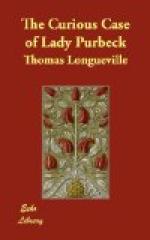“I have written a letter to yourself and Mr. Attorney concerning the business of the Lady Purbeck which I desire you on whose love to me I principally rely to aggravate and ayre the crimes of that Lady and her dealings with Lambe and the like, so soon as yet she may be before my coming to London committed to some prison for otherwise my brother who hopes to be going hence, will not be kept from her and she will (if he should come to her) so worke on him by her subtilty as that she will draw from him something to the advantage of her dishonourable ends and to his prejudice. Iff ffrodsham and Lambe once feele or be brought to feare their punishment I believe they will unfold much more than they yet have, for it seems they have but boath sported in their examinations, &c.”
This letter, again, proves that Lord Purbeck was on good terms with Lady Purbeck, and that Buckingham was striving to keep them apart; and it adds still further support to the theory that it was not Lord Purbeck but Buckingham who was trying to divorce Lady Purbeck, by “aggravating and airing her crimes.”
Buckingham himself was suspected of having dealings with Lambe on his own account; for Arthur Wilson says, in his Life of James I.:[72] “Dr. Lamb, a man of an infamous Conversation, (having been arraigned for a Witch, and found guilty of it at Worcester; and arraigned for a Rape, and found guilty of it at the King’s Bench-Bar at Westminster; yet escaped the Stroke of Justice for both, by his Favour in Court) was much employed by the Mother and the Son,” i.e., by the Duke of Buckingham and his mother. If this be true, Buckingham’s conduct towards Lady Purbeck, in connection with Lambe, does not seem to have been very straightforward.
Lambe’s “favour in Court,” however, proved no protection to him in the streets. Whitelock writes[73] in 1632: “This Term the business of the Death of Doctor Lamb was in the King’s Bench, wherein it appeared that he was neither Dr. nor any way Lettered, but a man odious to the Vulgar, for some Rumors that went of him, that he was a Conjurer or Sorcerer, and he was quarrelled with in the Streets in London, and as the people more and more gathered about him, so they pelted him with rotten Eggs, Stones, and other riff raff, justled him, beat him, bruised him, and so continued pursuing him from Street to Street, till they were five hundred people together following him. This continued three hours together until Night, and no Magistrate or Officer of the Peace once showed himself to stop this Tumult: so the poor man being above eighty years of age, died of this violence, and no Inquisition was taken of it, nor any of the Malefactors discovered in the City.”
On the 26th of February Chamberlain wrote[74] to Carleton:—




